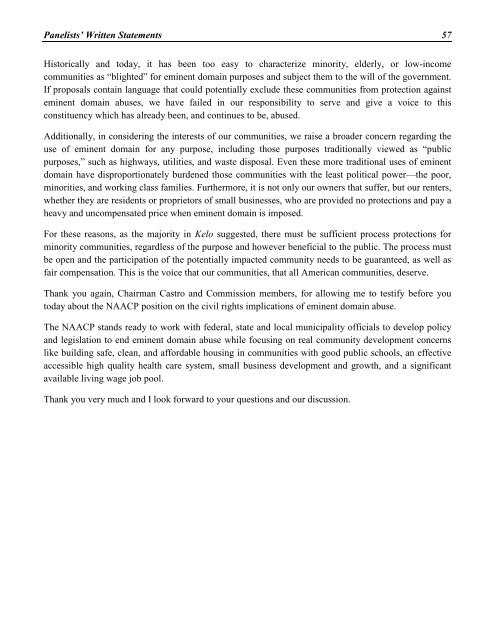Panelists’ Written Statements 57Historically and today, it has been too easy to characterize minority, elderly, or low-incomecommunities as “blighted” for eminent domain purposes and subject them to the will of the government.If proposals contain language that could potentially exclude these communities from protection againsteminent domain abuses, we have failed in our responsibility to serve and give a voice to thisconstituency which has already been, and continues to be, abused.Additionally, in considering the interests of our communities, we raise a broader concern regarding theuse of eminent domain for any purpose, including those purposes traditionally viewed as “publicpurposes,” such as highways, utilities, and waste disposal. Even these more traditional uses of eminentdomain have disproportionately burdened those communities with the least political power—the poor,minorities, and working class families. Furthermore, it is not only our owners that suffer, but our renters,whether they are residents or proprietors of small businesses, who are provided no protections and pay aheavy and uncompensated price when eminent domain is imposed.For these reasons, as the majority in Kelo suggested, there must be sufficient process protections forminority communities, regardless of the purpose and however beneficial to the public. The process mustbe open and the participation of the potentially impacted community needs to be guaranteed, as well asfair compensation. This is the voice that our communities, that all American communities, deserve.Thank you again, Chairman Castro and Commission members, for allowing me to testify before youtoday about the NAACP position on the civil rights implications of eminent domain abuse.The NAACP stands ready to work with federal, state and local municipality officials to develop policyand legislation to end eminent domain abuse while focusing on real community development concernslike building safe, clean, and affordable housing in communities with good public schools, an effectiveaccessible high quality health care system, small business development and growth, and a significantavailable living wage job pool.Thank you very much and I look forward to your questions and our discussion.
58 The Civil Rights Implications of <strong>Eminent</strong> <strong>Domain</strong> AbuseDavid Beito, Chair, U.S. Commission on Civil Rights’ Alabama State Advisory Committee<strong>Eminent</strong> <strong>Domain</strong> Through The Back Door In Montgomery, Alabama 1Thank you for inviting me here today. Let me start by saying that I speak for myself in this testimony,not the Alabama State Advisory Committee, which I chair. I have little to add to Ilya Somin’s insightfuland well-researched overview, and agree with the main thrust of his argument. As Somin points out,Americans into the early twentieth century greatly appreciated the link between civil rights and propertyrights. Civil rights champions ranging from the earliest abolitionists to the founders of the NAACPemphasized the constitutional protection of the right to acquire and hold property as essential to theeconomic progress of the poor and oppressed. In 1849, for example, Frederick Douglass declared that“civil government” should be “solemnly bound to protect the weak against the strong, the oppressedagainst the oppressor, the few against the many, and to secure the humblest subject in the full possessionof his rights of person and of property.” In defending property rights, of course, Douglass made adistinction between property originally acquired through mutual consent and homesteading, which heregarded as legitimate, and “property in man” which he viewed as “man-stealing.” 2Rather than revisit these broader historical issues, or even eminent domain as conventionallyunderstood, my testimony will highlight a generally overlooked threat to the property rights of the poorand vulnerable. For lack of a better term, this threat can be called “eminent domain through the backdoor.” I first encountered this phenomenon after becoming chair of the Alabama State AdvisoryCommittee for the U.S. Commission on Civil Rights. Our Committee took seriously the mandate of thenational Commission to look creatively and expansively at civil rights issues. One of our members,Margaret Brown, suggested that we examine the impact on state and local government policy on theproperty rights of minorities.Not long before our Committee took on this issue, the U.S. Supreme Court had handed down itslandmark decision in 2005 of Kelo v. New London. This ruling was highly permissive to localgovernments seeking to take property for economic development. In response to the “post-Kelobacklash,” more than forty states enacted laws to protect property owners and narrow the discretion of1 Margaret Brown, Farella Robinson, Shana Kluck, Christina Walsh, and Don Casey provided information which wasextremely helpful in the preparation of this paper. Any errors, however, are those of the author.2 Paul D. Moreno, Black Americans and Organized Labor: A New History (Baton Rouge: Louisiana University Press, 2006),12-14; David E. Bernstein, “Philip Sober Controlling Philip Drunk: Buchanan v. Warley in Historical Perspective,”VANDERBILT LAW REVIEW 51 (May 1998), 839-47; Frederick Douglass, “Comments on Gerrit Smith’s Address,” The NorthStar, Mar. 30, 1849, http://www.lib.rochester.edu/index.cfm?PAGE=4383, accessed July 20, 2011; Frederick Douglass,“Oration Delivered in Corinthian Hall, Rochester,” July 5, 1852, http://www.lib.rochester.edu/index.cfm?PAGE=2945,accessed July 20, 2011; and Frederick Douglass to Henry C. Wright, The Liberator, Jan. 29 1847; reprinted in Philip Foner,ed., Life and Writings of Frederick Douglass, vol. 1 (New York: International Publishers, 1950), p. 199,http://docsouth.unc.edu/neh/douglass/support9.html, accessed July 21, 2011.


